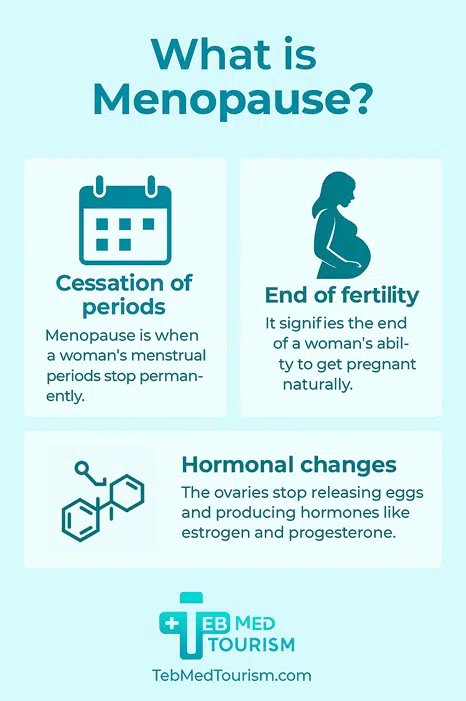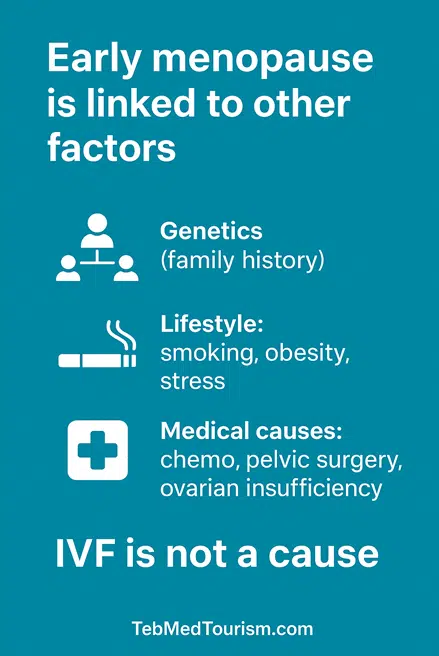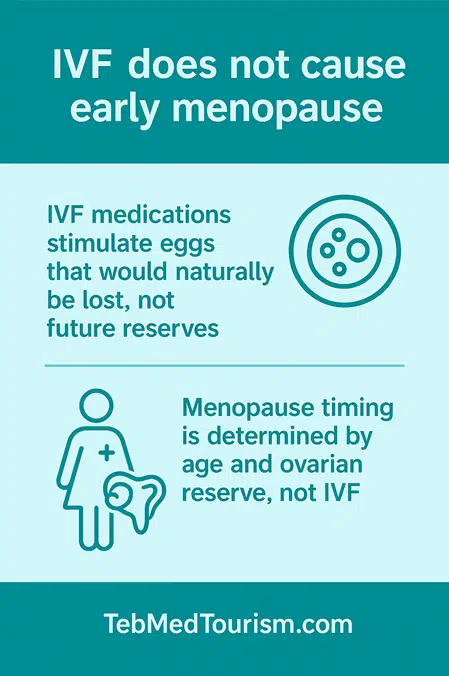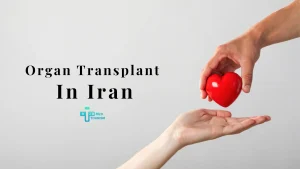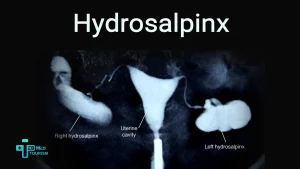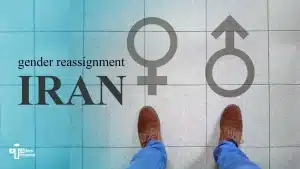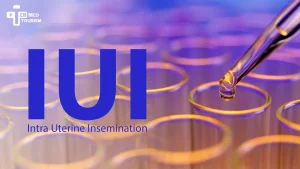Is theimpact of IVF on menopause significant for women? Because fertility medications promote the maturity of pre-existing follicles that would be lost normally during that cycle, rather than depleting the entire egg supply, IVF treatment does not result in menopause.
The idea that using more eggs causes the total supply to run out more quickly is the root of the widespread myth that IVF causes early menopause. Although IVF isn’t the cause of early menopause, women who have underlying poor ovarian reserve—a condition in which they have fewer eggs or a diminished response to stimulation—may be at higher risk for it. Understanding the impact of IVF on menopause is crucial for women considering fertility treatments.
What is menopause in women?
The menopause is the stage of life when you are unable to conceive and stop getting your period. After a year without a period, you have entered menopause.
In the years before menopause starts, a lot of things alter, including ovulation and hormone production. Menopause is commonly described in three stages. At each stage, the ability to conceive naturally changes. Women can more efficiently plan fertility treatments during these transitional years if they have a thorough understanding of IVF in Iran and the IVF cycle timeline.
You may want to learn about “IVF Journey”.
At birth, a woman contains roughly one million eggs. By the time she enters puberty and begins monthly ovulation, that number will be around 300,000, and it will continue to decline for the duration of her life.
Due to changes in ovulation and pregnancy-related hormones and a decline in the number of viable eggs in the ovaries, a woman’s odds of getting pregnant vary greatly with each stage of menopause. This makes knowledge of IVF process time and careful planning essential for women exploring assisted reproduction.
What are the causes of menopause?
The primary cause of menopause is the ovaries’ natural reduction of hormones, which results in the cessation of menstruation and fertility. Additional causes include primary ovarian insufficiency, some cancer therapies like chemotherapy and radiation, and surgical ovarian excision (oophorectomy). Although the majority of women naturally go through menopause between the ages of 45 and 55, smoking and other conditions can cause it to happen earlier.
In the following, we will describe some of the main causes of menopause:
Natural decline in reproductive hormones
A woman’s ovaries begin producing fewer of the hormones that regulate her menstrual cycle as she approaches her late 30s. They are known as progesterone and estrogen. Having fewer of them makes getting pregnant more difficult.
Women’s menstrual cycles may get heavier or lighter, longer or shorter, and more or less frequent throughout their 40s. Their ovaries eventually stop producing eggs. After then, they stop getting periods. On average, this occurs at age 51.
Surgical or medical interventions
Hormones that regulate the menstrual cycle, such as progesterone and estrogen, are produced by the ovaries. Menopause occurs immediately after ovarian removal surgery.
Your menstruation stops. Hot flashes and other menopausal symptoms are likely to occur. Because the operation causes hormones to plummet all at once rather than gradually over years, symptoms might be severe.
Menopause usually does not occur immediately after a hysterectomy, a surgical procedure that removes the uterus but leaves the ovaries intact. Although your periods are over, your ovaries continue to produce progesterone and estrogen and release eggs for a while.
Premature ovarian insufficiency (POI)
Approximately 1% of menopausal women experience it before turning 40. Premature menopause is the term for this condition. The ovaries may not produce the normal amounts of hormones, which can lead to premature menopause. We refer to this as primary ovarian insufficiency. Gene mutations or autoimmune diseases may be the cause.
Frequently, there is no known cause for early menopause. Then, doctors most frequently recommend hormone therapy. Hormone therapy, when used at least until the normal menopausal age, helps protect the heart, brain, and bones.
Environmental and lifestyle factors
Early menopause can be caused by environmental factors, such as endocrine-disrupting chemicals (EDCs) in air pollution, such as phthalates, bisphenols, and PFAS. Obesity and cigarette smoking are lifestyle factors that are known to hasten the onset of menopause, while other habits, such as moderate alcohol consumption and rigorous exercise, can have a variety of impacts and may postpone menopause.
Genetic and familial factors
With heredity impacting the age at natural menopause by as much as 50%, genetic and familial factors—such as having a mother or sister who has experienced early menopause—are powerful predictors of when you may go through menopause.
Numerous genetic variations, frequently linked to DNA repair, have been linked by studies to the menopausal age. Your personal chance of experiencing an early menopause is increased if there is a family history of it.
The abovementioned factors also influence the likelihood of IVF failure, making a personalized best IVF protocol crucial for optimizing outcomes.
What is early menopause?
When your ovaries cease producing hormones and your periods stop before the age of forty, you experience early or premature menopause. This may occur spontaneously (for no apparent reason). Surgery to remove the uterus or ovaries may potentially cause it. Early menopause can also result from medical therapies for breast cancer, such as hormone therapy or chemotherapy.
Primary ovarian insufficiency (POI) is a condition that occurs when your ovaries cease functioning normally before the age of forty. However, this syndrome is not the same as early menopause. Even if they might not occur frequently, periods are still possible if you have POI. Additionally, you may still be able to conceive.
Symptoms of Menopause
The symptoms of menopause and perimenopause can significantly affect your relationships, social life, family life, and career. Each person may experience it differently. You might not have any symptoms at all or a variety of them.
Usually, months or years before your periods stop, symptoms appear. We refer to this as the perimenopause.
Changes in Periods
Usually, but not always, a change in the regular pattern of your periods—such as irregularities—is the first indication of the perimenopause. You will eventually completely cease getting periods.
Mental Health Symptoms
Typical menopausal and perimenopausal mental health symptoms include: Alterations in your mood, such as depression, anxiety, mood swings, and low self-esteem; issues with memory or focus (brain fog);
Physical Symptoms
Menopause and perimenopause are frequently accompanied by the following physical symptoms as follows:
- Hot flushes are sudden sensations of heat or cold in the face, neck, and chest that can cause vertigo.
- Sleep issues that cause you to feel exhausted and agitated during the day could be caused by night sweats.
- Palpitations: a sudden increase in the visibility of your heartbeat
- Higher than normal headaches and migraines
- Aches in the muscles and joints
- Weight growth and a change in body shape
- Skin alterations, such as dry and irritated skin
- Decreased desire for sex
Dryness, soreness, itching, or discomfort in the vagina during intercourse - Urinary tract infections (UTIs) that occur frequently
- Gum discomfort, sensitive teeth, or other oral health issues
These symptoms are often a concern for women considering fertility treatments like IVF transfers, but IVF effects do not include causing early menopause.
Can IVF/fertility drugs cause early menopause?
No, many people believe that IVF may accelerate the menopausal transition by making you ‘run out of eggs’ more quickly. Nevertheless, there is no proof that this is the case. Early menopause is defined as the onset of menopause before age 45.
Despite popular belief, the effect of IVF on menopause does not include accelerating menopause or causing IVF early menopause. IVF uses eggs that would naturally be lost in the cycle, rather than depleting future reserves. Therefore, IVF early menopause is not caused by treatment.
Certain chemotherapy treatments and psychiatric medications may cause a chemical menopause, but IVF and menopause are generally unrelated in this context. If women understand menopause and IVF treatment, they can be sure that fertility treatments are safe for their long-term reproductive health.
Awareness of IVF and autism concerns and the impact of IVF on genetic diseases is also important when considering IVF.
Is pregnancy possible after menopause?
Statistics show that women are most likely to conceive naturally during the premenopausal and, to a lesser extent, perimenopausal periods. By the age of forty-one, up to half of women are unable to conceive naturally. It increases to 90% at age 45 and approaches 100% at age 50.
The onset of menopause, decreased hormone production, and poor egg quality could all be reasons for the rising prevalence of infertility. After menopause, is it possible for a woman to conceive naturally? After menopause, ovulation cannot be triggered by hormone levels, making natural pregnancy very impossible.
Additionally, the reverse menopause effect is produced by regenerative medicine, which has a good impact on the likelihood of becoming pregnant naturally throughout menopause. The process of ovarian rejuvenation increases a woman’s chances of becoming pregnant naturally.
Although natural conception after menopause is rare, assisted reproductive technologies, including IVF after menopause, make pregnancy possible in some cases. Regenerative medicine and ovarian rejuvenation can sometimes help restore fertility potential. Knowing the IVF process time and expected outcomes helps women plan realistically.
What are the treatments for the symptoms of menopause?
Menopausal symptoms might not require therapy. However, there are a number of therapy options available if you do:
Lifestyle changes
You might realize that altering your lifestyle helps you control your symptoms. The following adjustments could help you feel better:
- Dress in layers that you can take off when a heat flash occurs if you get them. When you experience a heat flash, you might want to keep a handheld fan with you.
- Steer clear of coffee, alcohol, and spicy meals. They may exacerbate the symptoms of menopause.
- Quitting smoking is a good idea for your general health as well as for hot flashes.
- Make an effort to keep your weight in check. Obesity or being overweight might exacerbate hot flashes.
- Maintain healthy sleeping patterns. Make sure your bedroom is cold, quiet, and dark.
- Engage in frequent physical activity. It can enhance your mood, help you sleep better, and reduce your risk of developing several age-related illnesses.
- Reduce stress, for instance, by practicing relaxation methods including deep breathing, meditation, and muscle relaxation.
You might want to speak with your healthcare physician if making lifestyle adjustments isn’t enough to relieve your symptoms. Your symptoms, medical and family history, and preferences will all be discussed. They are also able to describe the advantages and disadvantages of the therapy.
For severe symptoms, medical therapies can complement lifestyle changes. Women can also discuss Increase Chances of IVF Success strategies with their healthcare provider to improve outcomes.
Conclusion
The impact of IVF on menopause is not early menopause or the acceleration of the natural decline of a woman’s ovarian reserve. While underlying conditions like poor ovarian reserve may influence menopausal timing, the use of fertility medications in IVF simply promotes the maturation of eggs that would otherwise be lost during a cycle. Women can therefore pursue IVF with assurance because they know it won’t negatively impact their long-term reproductive health.
It is important for women to understand how menopause and IVF treatment interac. TebMedTourism provides comprehensive IVF and menopause services, combining international standards, personalized care, and safe treatments to support women in achieving parenthood at any stage of reproductive life.
Does IVF cause early menopause?
- No. IVF does not cause early menopause. Fertility medications used in IVF stimulate existing eggs that would naturally be lost, rather than depleting your overall egg reserve.
How does IVF affect menopause?
IVF has no effect on when ovarian function naturally declines or speeds up menopause. IVF treatment has nothing to do with early menopause in women with low ovarian reserve.
Can you start menopause after having a baby?
Menopause timing is mostly determined by age and ovarian reserve, not pregnancy. Having a baby does not trigger menopause.
Does IVF prepone menopause?
No. IVF does not advance the onset of menopause. It uses eggs that would otherwise be lost during the menstrual cycle, leaving future fertility largely unaffected.
Does pregnancy affect menopause?
Ovulation is temporally stopped during pregnancy, but the time of menopause remains same. As ovarian hormone production decreases with age, menopause happens spontaneously.








